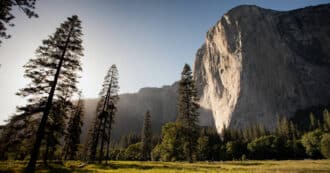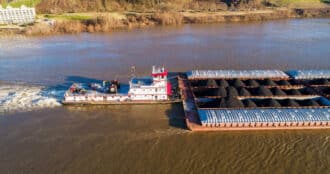The Rev. Dr. Leah D. Schade
In Acts 17, Paul says the “unknown god” created everything. One of the best ways to know God is to immerse yourself in God’s Creation.
Here are ideas for reading and preaching Acts 17:22-31, the story of Paul preaching at the Areopagus, and John 14:15-21, Jesus’s instruction to love and follow his commandments. This is part of the EcoPreacher 1-2-3 series to equip preachers and congregations for engaging the Bible through an ecological lens. These texts are assigned as part of the Revised Common Lectionary for the Sixth Sunday of Easter, Year A.
Eco-Exegesis
Eco-exegesis is a method of interpreting the biblical text through a green lens using the principles of ecological theology.
Acts 17:24-25
24The God who made the world and everything in it, he who is Lord of heaven and earth, does not live in shrines made by human hands, 25nor is he served by human hands, as though he needed anything, since he himself gives to all mortals life and breath and all things.”
Paul engaged the Greek scholars, poets, politicians, and philosophers in the public gathering place of the Areopagus in order to proclaim an important truth about God. There in Athens, surrounded by shrines, altars, and hand-crafted sculptures of deities, Paul challenged the idolatry that he witnessed. It seemed that every aspect of life had its own god or goddess that required homage – and payment, which ultimately benefited the makers and keepers of those idols. They even had an altar to a nameless god, in essence, recognizing the mystery of whatever unknown deity might be out there. But Paul pointed out that the god whom they called “unknown” was, in fact, fully knowable through the heavens and earth that God created, and through the very breath of life.
One of the ways this passage in Acts can connect our faith with God’s Creation is by heeding its warning not to be fooled by those who construct systems that misdirect our worship away from God. While the places where we gather to worship are important and necessary, they are not a substitute for encountering the Lord of heaven and earth through heaven and earth itself. We need only step outside of our buildings to witness the grandeur of God’s Creation – and the ways in which we have desecrated it through our idolatry of wealth, relentless acquisition, and self-serving individualism. Turning back to God redirects our attention toward honoring God through honoring “the world and everything in it.”
John 14:15-16
15“If you love me, you will keep my commandments. 16And I will ask the Father, and he will give you another Advocate, to be with you forever.”
When Jesus used the word “love” in this farewell speech to his disciples, he was not talking about a romantic kind of love, or the type of love between friends or family. In Greek, the word is agape, and it means to love in a moral or ethical sense. Agape love is unconditional, sacrificial, and selfless. Jesus is clear that following the commandments to love God and love neighbor are the way to love him. It means seeking the good of the community and the flourishing of everyone instead of focusing only on one’s desires.
As our planet and human communities continue to suffer from pollution, climate change, and violence toward Earth and each other, it becomes more and more obvious that the only way to avoid catastrophe is to practice agape love. This love will compel us to protect fragile ecosystems that ensure life on this planet can continue. This love will sacrifice short-term profit in order to ensure long-term survival of our species. And this love will seek the good of both humanity and our Earth kin, realizing that our lives are inextricably bound together.
Fortunately, Jesus promised that this seemingly impossible requirement of selfless love comes with a promise of divine presence to create this flourishing. In Greek, the word for this presence is paraclete. Sometimes translated as “comforter,” or “advocate,” the Paraclete is another way to understand the Spirit named in the next verse. As Christians, we can trust that the Spirit comes alongside us as we come alongside others in our advocacy for climate and environmental justice, restoration, healing, and reparations.
1. Eco-Idea
The Eco-Idea is one succinct statement that tells us who God is and/or what God does in relation to Creation and how we should respond as people of faith.
Knowing and loving God means knowing and loving God’s Creation and leads to advocacy to protect this fragile yet magnificent planet.
2. Eco-Questions
Eco-Questions are what we can ask to help a congregation draw out the implications of the Eco-Exegesis and Eco-Idea.
- Where do you experience the presence of God in Creation? Invite the congregation to think about a place where they felt a connection between nature and the Divine and then to share that with each other. What was it about that place that conveyed a sense of wonder, awe, majesty, simplicity, complexity, or just being at home in the world?
- What does love look like in our relationships with our Earth kin? Does it mean to pay close attention with our eyes, ears, taste buds, skin, and hearts? Or to protect fragile ecosystems as they are supporting life on this planet? Does it look like introducing a child to the natural world and cultivating love and respect for the processes of life?
3. Eco-Actions
Eco-Actions are ways that a congregation might respond to the Eco-Idea and Eco-Questions. One of these possibilities may have salience for your ministry context.
- Preach and share stories of faith leaders who engage in the public square to advocate for protecting Earth, communities, and human health. The book Rooted and Rising: Voices of Courage in a Time of Climate Crisis, edited by Leah D. Schade and Margaret Bullitt-Jonas, has 21 chapters by spiritual leaders doing this work. Check out the chapters by Rabbi Mordechai Leibling, Green Muslims founder Huda Alkaff, Quaker activist Jay O’Hara, public health advocate Natasha DeJarnett, and youth climate activist Kiran Oommen for examples of faith in action.
- Plan an ecumenical or interfaith book study with the edited volume, All We Can Save: Truth, Courage, and Solutions for the Climate Crisis, edited by Ayana Elizabeth Johnson and Katharine K. Wilkinson. The 58 short essays are divided into eight sections with themes such as “advocate,” “persist,” “feel,” “nourish,” and “rise.” At the end of the study, plan one action your group can do together to live out your faith in the midst of God’s Creation.
- Order Bible Eco Infographics to display in your church. The Interfaith Center for Sustainable Development (ICSD) has developed seven attractive infographics on the Bible and ecology. The infographics help viewers visually understand Bible-ecological concepts in relation to biodiversity, animal welfare, food, and trees. The infographics are available for purchase as large ecologically-printed posters. With increasing environmental concern within faith communities around the world, these Bible eco-infographics represent an innovative channel to convey biblical ecological teachings. To order the infographics click here.





